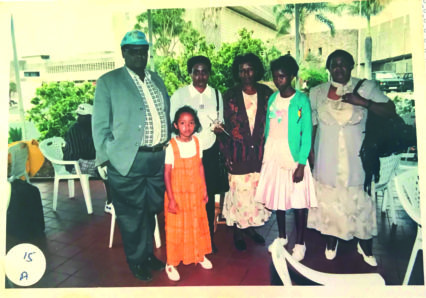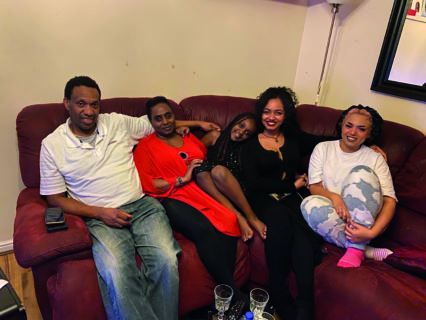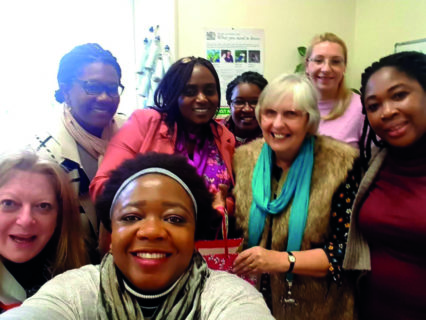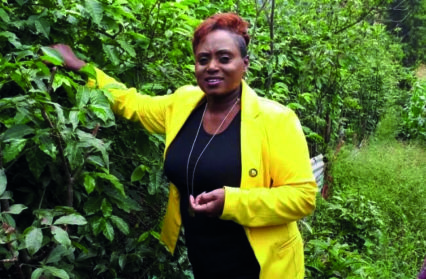Wanjiku Ngotho-Mbugua writes on supporting the BME community in Wales and how it feels to long for home.
Wales Arts Review continues their celebration of Parthian’s Seventy Years of Struggle and Achievement: Life Stories of Ethnic Minority Women Living in Wales with an essay from Regional director of BAWSO Wanjiku Ngotho-Mbugua.
I was born in a small village in Kenya called Kiambururu, about 30 miles from Nairobi. I was the seventh of nine children, four boys and five girls. My father was a city planner for the city council in Nairobi. He commuted from the village and, as he was one of the few people in the village who had a car, he was regarded as a rich man. My mother was a housewife and took care of us, but she was also very enterprising and did all different kinds of farming. She grew coffee, maize and potatoes and sold them to the markets and coffee factories.
My parents were very religious. They were both Catholics, which was very unusual in my village, where most people were Presbyterians, and there were no Catholic churches in my village. Mass was said in our sitting room with a priest every day, and on days like Good Friday and Easter Sunday, we would walk long distances to the parish church just so that we could join the other parishioners.
When I was growing up, my father made me feel I was very special and told me I was an intelligent person and would go to university and make a good career for myself. So I grew up very confident that I was going to make something of my life because he put so much hope and confidence in me.
I loved reading, and if my sisters couldn’t find me, I’d usually be on the side of the road reading a torn up piece of newspaper. In the village, there wasn’t much to do. We had a big field where we played different games with our mates—hide and seek, jump rope, and we went to the river looking for eels. But we didn’t have much time to play, as we worked a lot. We were expected to plant and help with the harvesting of coffee and taking it to the factory, about two or three miles away, carrying it on our back. Today, in this country, this would be looked at as child labour, but it wasn’t, and it gave us purpose and discipline.

I went to a very good girls’ high school run by strict German Catholic Precious Blood sisters, and then went to Nairobi University and studied for a BA in linguistics and literature. I was quite young when I finished university— about nineteen or twenty. I’d also had a baby at university, so afterwards, I went back home with my daughter. I had to get a job quickly to support us, so I started teaching in a high school in a nearby town and stayed for about six years.
In the year 2000, I made my first trip to Europe to visit my older sister in Ireland. I liked it so much there, I kept thinking, what can be better than living here? I thought I’d have better opportunities in Europe, so I returned to Ireland at the end of the year with my daughter. The following year, I met my future husband in Ireland, and we travelled and lived in various places like Malaysia, Bangladesh, Dubai and Botswana.
From Botswana, we decided to come to Wales at my husband’s request. I’d heard of Wales but had no idea where it was. We found a place in Maesteg and arrived in 2001. I was pregnant with my second daughter at that point. My first daughter, who was six, went to the local school, where she suffered really bad racism. We spoke to the teachers about this, and they said there was nothing they could do. We decided to move to Pencoed, and I got a job in a Sony TV factory. I had to leave for work at 6am, but I became friends with some mothers who helped me to take my daughter to school in the morning. My husband eventually left us and returned to Ireland, and my girls and I lived in Pencoed for three or four years, and I got a job with Legal and General in Cardiff.
While I was in Cardiff, a friend who had volunteered with Bawso (Black Association of Women Step Out) told me they were recruiting. So I went into work for Bawso in 2005 as a floating support worker, helping a lot of asylum seekers and refugees settled in the Cardiff Bay area with housing and tenancy issues.
In 2006, a job opportunity arose for Bawso in Wrexham. I didn’t even know where Wrexham was, but I got the job and ended up moving to Wrexham. I worked so hard and was alone, though I got a few volunteers in the community. And I was able to evidence our work, such that the following year, the Welsh Government funded our work for the first time in Wrexham. We then recruited three support workers and had many volunteers. In 2009, we got funding from the Welsh Government and were able to purchase a building.
The project is working really well. We now have about twelve fulltime workers in the project, covering the whole of the six counties of north Wales. The work I do on a daily basis is fighting an ongoing battle for people who’ve been discriminated against or denied certain rights because of their ethnicity or race. I’m a voice for BME people in north Wales and bringing their issues to policymakers so they can include them.

I’ve also supported girls that have come from abroad and got married to local men in north Wales, and the marriage has broken down because of domestic abuse or worse, where they’ve been brought here as sex slaves, or so that the girls can work for the men’s businesses and clean for their relatives. Many of these girls are running away from Kenya or countries in Asia, and they’re selling themselves so cheap. And often, the local men leave them in such a sad situation that they have nothing and don’t know where to go next.
I have this vision of educating girls before they come here, to prepare them for what may happen and where to go for help if things go wrong. The life that they are aspiring to live in the UK, they can do it in Kenya if they work hard and get qualifications, then they can get jobs. I want to tell them that if they come to the UK, they may make a lot of money, but they’re losing a lot in their family and social life. They’ll be looked down upon and discriminated against, and people will call them names. But if they’re going to come to the UK, they should be equipped to know what their rights are. Come in as a nurse or a doctor, but don’t come through the back door because it’s a trap, and you can imagine how difficult it is when you haven’t got the right papers to be here.
It’s amazing that in the work that I do, I see so many women that are in the situation that I was in, so it’s an issue that’s very close to my heart. I tell them I’ve gone through something similar and give them hope. Everybody thinks, how can I survive in this foreign country on my own with the children? So I say to them that at least they’ve got somebody holding their hand. I also make a point of introducing myself to every BME person that I meet and tell them where my offices are, and invite them in for a cup of tea. The people that I’m supporting here are on their own and very isolated. I feel privileged and blessed to be able to help people in this way. I’ve been in this role now for over fourteen years, and I’ve really enjoyed it and couldn’t ask for a better job.

I thank God and am so grateful for everything I’ve had in the UK, but this is my children’s home, not mine. I left Kenya because I thought life was much better here, and it’s not. There may be positive things—we’ve got a good health system, good roads and good schools. But on the other side, the social life is really bad, and it’s much easier to get stressed or depressed here or to have more mental health issues than back home.
Sometimes I wonder what would have happened to me had I gone on with life in Kenya. Where would I be? I made the choice to come here, and nobody forced me. My only regret is that I’ve lost a lot of time with family and friends and can’t spend as much time with them as I would like. In the last few years, I’ve gotten really homesick for Kenya. I listen to music on Kenyan radio every morning and switch on Kenyan news in the evening. And I started a group from my house called the North Wales Kenyan Community, and we come together every so often and share our food, music, and we talk, discussing anything happening in Kenya. That’s one way of alleviating homesickness when you have people that are from the same background as yourself.
But I’m definitely going back to Kenya when I’m still young and strong and can give something back. I want to give back through charitable work and supporting people. I would definitely do a lot of work with victims of domestic abuse in Kenya.
Overall, I’m a very positive person. It takes me a lot to be negative about something. Because of the confidence I grew up with, that’s never left me. But some of the girls I’m supporting now weren’t that lucky. Some didn’t even have parents growing up, so I really am grateful to my parents, and it’s what has helped me fight, and what is now helping me to fight for other people.
Seventy Years of Struggle and Achievement is available via Parthian.












